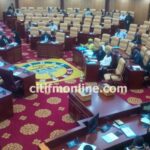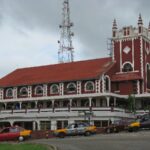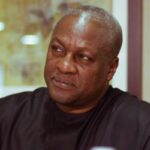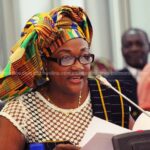
Two years ago, the governing National Democratic Congress (NDC) was violently against the introduction of Free Senior High School education in Ghana. It was the main policy of the opposition, New Patriotic Party (NPP) to Ghanaians for the 2012 elections. The party’s presidential candidate, Nana Addo said making secondary education free was the first step to transforming the nation.
The goal was to make secondary level the termination point for basic education in Ghana. Though the NPP could not tell how much it would cost to implement the policy or how it planned to fund it, officials were convinced the party’s government could foot the bills of all senior secondary students if they were elected.
The NDC said the policy was unrealistic. Officials argued that it was better to improve quality and access at the basic level, which has been free for decades but hadn’t seen much improvement. They made a case for a system where students from more impoverished communities would be targeted and sponsored by the state to get an education at that level. They gave so many good reasons why it would be unwise for a government to introduce free SHS at this point in Ghana’s
Oddly enough, President Mahama announced in his 2014 state of the nation address that his government would be implementing what he described as progress Free Senior High School policy at the beginning of the 2015/2016 academic year. On Monday, the Deputy Minister in charge of Tertiary Institutions, Samuel Okudzeto Ablakwa revealed that the project will begin with some 36,500 students at the cost of GHC 42.7 million. He also explained that the government has enough funds to sustain the project.
It is wonderful that the government has the funding of the policy covered, but it is not enough. As many have said when the issue first came up, free SHS isn’t such a bad policy, but the details and the timing don’t make sense. Perhaps government officials have forgotten the reasons they so eloquently made for the rejection of the NPP’s bid. So here are some of their questions.
1. What happened to let’s fix basic education first; FCUBE has introduced decades ago, the idea was to ensure that all Ghanaian children received an education no matter the economic backgrounds of their parents. Ghanaian children still study in conditions unfit for animals – windowless rooms, under trees, on bare floors, as well as contributing to buy teaching and learning materials. Quality education for all requires well-trained teachers, active learning techniques, relevant curriculum and adequate facilities, have achieved all this at the basic level?
2.Is the quality at the basic level good enough: Early Grade Reading Assessment” report commissioned by the Ghana Education Service (GES) for primary two pupils showed that 98 percent of primary two pupils in basic schools can neither read nor understand English or any Ghanaian language properly. Many pupils complete primary six, but cannot write their names or do simple arithmetic. Can these pupils qualify to enter senior high schools? And if they drop out, can they ever compete? Some of the reasons are pupils struggle through primary and junior high school without getting properly educated is due to the lack of textbooks, shortage of teachers, teacher absenteeism, a lack of teaching and learning materials among numerous challenges. All the problems in basic education are a result of disinvestment in education over a long period which has left public primary and junior high schools as the places to go if your parent cannot pay for the expensive private education. Instead of spending huge sums of money educating all students in senior high schools, the government could spend some of the 42.7 million cedis improving quality at the lower levels where students build their foundation for higher education.
3. Can the government afford to fund free SHS: Just a few weeks ago, the special schools for the disabled were forced to delay re-opening because the government had not released subventions for the 2013/2014 academic year. Last year secondary schools in the three regions in Northern Ghana delayed re-opening for the same reason. The president’s argument in 2012 was that fixing primary and junior high school education was the key to transforming the education sector. He was right, if we have so much money, why not invest in improving basic education across the country. The State needs to spend more on education at all levels, build more schools, review curriculum and improve outcomes, all of which cannot be done with this move to educate all high school students for free. The Mahama government plans to begin its progressive free education policy with day students but plans to extend to boarding students. The data show government spends nearly 90 percent of the budget allocation for senior high schools on tuition, feeding grants and utilities for boarding students, making the boarding system a high-cost center for the government. The numbers of students in boarding are bound to increase with the extension of the progressive free senior high school education to them, which will, in turn, will increase the cost of public education. The cost of boarding alone will leave government always struggling for money to pay for education. Rather than a policy that will financially cripple the government, how about a free education for high school students where the majority of the students live at home and go to school is something we can support. It will boost access at all levels, sustain communities and improve outcomes. Right now, the government cannot fund free SHS, create more space and improve the quality of education
4. Why does the government want to pay the fees of all secondary school students? This is a no-brainer. As a result of the low quality of public basic schools, many Ghanaian parents spend more educating their children in expensive private schools. If a parent spends thousands of educating their child at a top private school, their child shouldn’t be paying for the education of the child in senior high school. It seems unfair, but the State with finite resources should focus on the poor and the most vulnerable groups of people. The way to find money is to let the folks who can afford to pay the fees pay for tuition and everything else that governments plan to take on board with this populist policy. Since boarders consume more scarce government resources than day students, their parents should be made to pay. Even then they would be occupying space that could be used as classrooms and other learning areas. The best thing here would be to end boarding and use the savings to improve education at all levels. why give everybody a free ride when you need money to improve schools in rural communities?
5. What happened to the targeting students from deprived communities: Government insists this isn’t just another political trick, but part of its plan to ensure that students from poorer communities and deprived students receive senior high school education. It can still do it without paying for everybody. It can establish scholarships for such students. It can also ensure that the community secondary schools are of the same standard and quality in top secondary schools in the country. So poor students can attend these schools for free, thereby creating room in the top schools for parents who can pay for the full cost of secondary school education.
6. Is free SHS really necessary at this point: The government says their progressive free senior high school education is enshrined in the constitution. Great. But so is the provision of basic amenities (like water, roads, electricity, housing, and schools).The Mahama government is overwhelmed with the management of the education system. It has not been able to reduce teacher absenteeism, expand infrastructure, provide teaching and learning materials, it shouldn’t be allowed to destroy the already weak senior secondary education.












I think the mahama administration is confused. Decision taking is their problem. They think they can deceive everyone with their propaganda but not everyone Ghanaians are very intelligent. The mistake we made in 2012 will not be repeated.